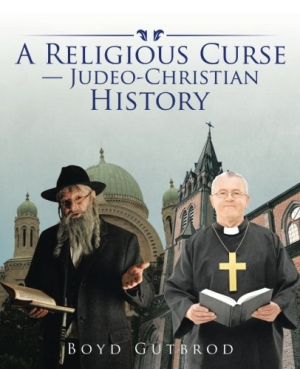A Religious Curse: Judeo-Christian History
A Religious Curse effectively decimates all excuses made for Christian anti-Semitism.
Boyd Gutbrod’s A Religious Curse is a smart, contextualized introduction to ancient Judaism and its connections to Christianity.
Early on, Gutbrod candidly details his anti-Semitic childhood, which he drew himself out out via interest in biblical history and with the help of the Biblical Archeology Review. His book aims to serve the same function that his personal studying did: sorting through history for truths, and showing how the Bible was used to justify biases toward whole groups of people.
His methods for addressing the Jewish-Christian rift are subtle. The book systematically highlights the complexity and diversity of early Christian, and Jewish-Christian, communities, and showcases the bevy of arguments around topics like canonicity, heresy, and the early church observance of Jewish laws. The picture that forms behind all of this history is one in which it becomes clear that Christian anti-Semitism was a conscious choice, and not a given for the faithful—just as all doctrines and positions are shown to have been the product of human choice, divinely inspired or not.
In painting this picture, Gutbrod presents the Bible through a historically critical lens, exploring how concepts like sin, hell, and the soul developed to arrive at current understandings. Such passages are interreligious and concise, serving as a good exegetical primer. Quick introductions to apocryphal biblical works are provided alongside explorations of the causes of their eventual exclusion from Jewish and Protestant canons.
“Human nature and needs shaped our history and our religions,” Gutbrod says, and this perception fluidly informs his interactions with scriptural texts and religious history. Chapters wind between exegesis and theology, raising interesting questions (“is God all powerful?”, in relation to Job) and meditating on features of biblical practice, like prayer.
A midbook introduction to Jewish history, and to the Christian-Jewish split, is as informative as it is brisk. Gutbrod’s situation of Jesus in a Jewish context is an important—if lately arrived at—contribution to his ultimate project goals, while a later examination of the position of Jewish Russians within the Russian Revolution begins the book’s most forceful examination of modern anti-Semitism. Topics are not always transitioned naturally between, but all maintain constant interest.
Because the book synthesizes extant biblical scholarship to do its work, internal citations, while intermittently present, are often missed. This is particularly true surrounding previous scholarly revelations, like the notion that a woman was responsible for the Hebrew Bible as it is known today. The author is clearly well-versed in current scholarship; sans attributions, though, it’s unclear which notions are his own, and which are borrowed.
Prose is fluid, lucid, and engaging throughout. At turns, it is even elegant, as when Gutbrod speaks of the Bible’s “intrinsic spiritual magnitude” and beauty. Literalists may pull away from the book’s points, but the work reads as an act of faith, and those elements stand to inspire.
Arguments, such as around the status of the apocrypha, sometimes repeat—not to entirely ill effect, but in a way that does slow reading progression. Cover images are almost caricatures, and fit unevenly with the poised nature of the text.
A Religious Curse is a thoughtful and studied examination of connections between Judaism and Christianity, from the first century forward, that effectively decimates all excuses made for Christian anti-Semitism. It is sincere and valuable work.
Reviewed by
Michelle Anne Schingler
Disclosure: This article is not an endorsement, but a review. The publisher of this book provided free copies of the book and paid a small fee to have their book reviewed by a professional reviewer. Foreword Reviews and Clarion Reviews make no guarantee that the publisher will receive a positive review. Foreword Magazine, Inc. is disclosing this in accordance with the Federal Trade Commission’s 16 CFR, Part 255.

